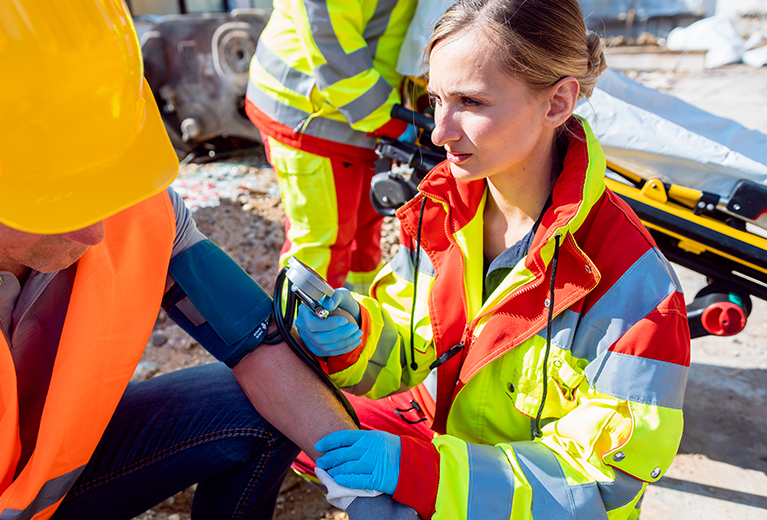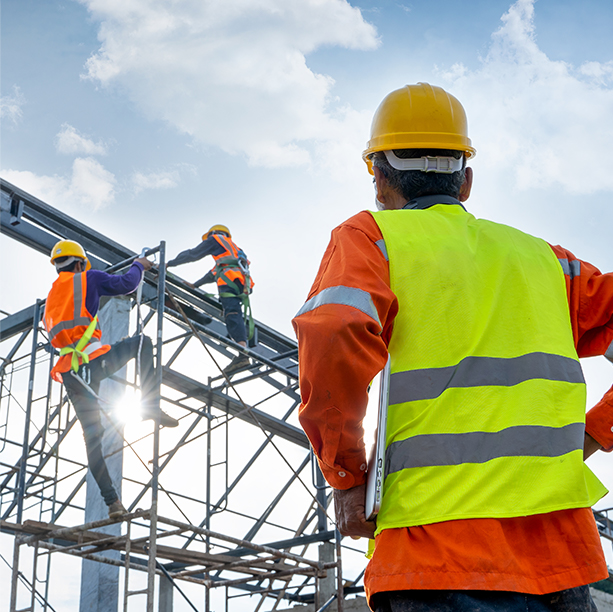 What types of construction accidents cause the most injuries and deaths? Unfortunately, four types of accidents occur often enough in the construction sector that they’re known as the Fatal Four. The leading cause of construction site accidents, by far, is falls. Falls cause more than 35 percent of injuries and 17 percent of deaths at construction sites.
What types of construction accidents cause the most injuries and deaths? Unfortunately, four types of accidents occur often enough in the construction sector that they’re known as the Fatal Four. The leading cause of construction site accidents, by far, is falls. Falls cause more than 35 percent of injuries and 17 percent of deaths at construction sites.
Electrocution is the second most common construction site accident. Unfinished electrical work is a given at some point in many construction zones. Sockets and open wiring in the middle of the completion process can pose extreme danger to workers and passersby. Electrical hazards cause more than 8 percent of construction site-related fatalities.
The third most common construction site accident is “struck by an object.” “Struck-bys” cause roughly 8 percent of construction site fatalities. Toppling bricks or other materials, dropped tools, or other objects can strike a worker. The heavier the object is, and the higher the height it falls from, the more serious the injury.
A type of accident known in the industry as a “caught between” is the fourth most common of the Fatal Four. These accidents involve a worker caught between at least two objects, two pieces of heavy equipment, or a moving piece of equipment and a wall on a construction site.
The Fatal Four cause roughly 60 percent of all construction worker deaths. The other 40 percent of deaths are caused by something else, which means that construction workers and other people on construction sites have to watch out for innumerable different hazards while they work every day. They work with heavy equipment, complex and heavy tools, and often at heights or on excavation sites. All of these dangers potentially multiply the ways workers can suffer injuries.
What Are the Most Common Injuries on Construction Sites?
People on construction sites can suffer every conceivable type of injury. Some, such as broken bones or cuts, may cause temporary pain but ultimately heal, allowing you to get back to your normal life. Other injuries, such as traumatic brain injuries (TBI) or spinal cord injuries, can result in the injured person needing lifelong care and permanently losing mobility or other functions.
These latter types of injuries often carry the adjective “catastrophic,” meaning they exert an immediate negative impact on the injured person’s life. The injured person may lack the ability to perform the activities of daily living (ADL), such as bathing or dressing, or be unable to work again.
Construction accidents may cause:
- Head injuries
- Back injuries
- Traumatic brain injuries
- Spinal cord injuries
- Broken bones
- Cuts
- Bruises
- Burns
- Crush injuries
- Scarring
- Amputation or loss of limb
- Loss of use of a limb
- Electrocution
- Nerve damage
- Disfigurement
- Coma
Dealing With Insurance Companies After a Construction Accident
Dealing with insurance companies after a construction accident can challenge injury victims and their families. The sad fact is that insurance companies often put their profits before a fair settlement.
What does that mean for you? It means that they may deny your claim. Or they may pay something, but far less than you deserve.
Some insurance companies may question whether the accident caused your injuries. If your injuries stem from another cause than the accident, the insurance company doesn’t have to settle. Or, they may question the severity or effects of your injuries to try to minimize any settlement you receive.
Some companies try to settle very quickly, but for an amount that doesn’t justly compensate you. They are betting that your relief at receiving a check will translate into not questioning, or feeling dissatisfied with, the amount of the settlement.
Lawyers have seen insurance companies pull all these tricks and more. As a result, lawyers are skilled at countering them. We can demand justice for you. Lawyers negotiate for the settlement you deserve, not the settlement insurance companies want to give you.
Achieving a Fair Settlement
If all else fails, a lawyer can bring a lawsuit in civil court to obtain just damage compensation for you. Insurance companies most commonly don’t want to go to trial. At trial, there is a risk that the jury will award you a very high amount, and insurance companies are generally risk-averse.
Evidence is the most important element in achieving a fair settlement, either from an insurer or the court system. You need evidence of who or what caused the accident or other incident that caused an injury. You also need evidence of your injuries and how they have affected your life. A lawyer can help you gather the evidence you need to support your case.
Evidence can include:
- Reports from the police, fire department, site inspectors, or other official bodies called in response to an accident or unsafe conditions
- Eyewitness accounts
- Accounts of site conditions from other people
- Images or videos of the site
- Images or videos of the accident
- Medical records
- Accounts from emergency personnel, such as ambulance drivers
- Images or videos of your injuries
- Expert testimony on your prognosis, such as your ability to work again
While your first duty after a construction accident is to see to your health and safety, keep in mind the need for evidence. It’s a very prudent idea, for example, to take pictures of your injuries as soon as possible. Bruises can fade; a court needs to see the injuries the accident caused, not the healing skin.
It also helps to take notes immediately after the accident. What happened? What do you remember? What caused the event? What happened after that? While notes aren’t evidence, they can help you and your attorneys establish timelines and understand what happened.
Talk to a construction accident lawyer as soon as possible after a construction accident. Your memory may fade, as can that of eyewitnesses and colleagues. Surveillance videos may be erased. Witnesses may move away. Evidence gathering simply becomes more difficult as time goes by.
If you want to bring a suit to court, you must do so within three years of your injury or a loved one’s injury-related death. That deadline is called the statute of limitations. If you file a legal suit after that deadline, the court will refuse to hear it. But just because the statute of limitations is three years does not mean you should wait three years. The earlier you contact a lawyer, the better chance you will have in making a successful case.
What If My Loved One Dies in a Construction Accident?
If a construction accident causes a fatality, family members can receive compensation through a wrongful death lawsuit. In Michigan, a personal representative will bring the suit on the decedent’s behalf.
Family members who may be entitled to damages in a wrongful death suit include:
- The spouse
- The children
- Surviving parents
- Surviving siblings
- Surviving grandparents
- Surviving children of the spouse
- Beneficiaries of property in the deceased’s will
Wrongful death suits are simply a type of personal injury suit in which the result was a fatality rather than an injury from which recovery was possible. They need the same proof of negligence and liability. But the compensation is somewhat different; it includes compensation for the claims the decedent could have brought as well as the losses suffered by family members.
Family members can seek compensation in the following categories:
- Funeral and burial expenses
- Hospital and medical expenses incurred before death
- The deceased’s pain and suffering between the incident and death
- Loss of financial support the deceased person provided to dependents
- Loss of the deceased’s care and companionship
Gruel Mills: Let a Grand Rapids Construction Accident Lawyer Fight for Justice
Construction accidents often cause serious and potentially fatal injuries. Obtaining just compensation after this kind of accident may prove a challenge for injured people and their families. But at Gruel Mills in Grand Rapids, we have decades of experience fighting for the rights of those injured in construction accidents. Reach out to a personal injury lawyer.
Our first consultation is free. Contact us at (616) 235-5500 or online.
Gruel Mills – Grand Rapids Office
Campau Square Plaza Building
99 Monroe Ave NW #800
Grand Rapids, MI 49503
Phone: (616) 235-5500
Read client reviews on Google!


 What types of construction accidents cause the most injuries and deaths? Unfortunately, four types of accidents occur often enough in the construction sector that they’re known as the
What types of construction accidents cause the most injuries and deaths? Unfortunately, four types of accidents occur often enough in the construction sector that they’re known as the